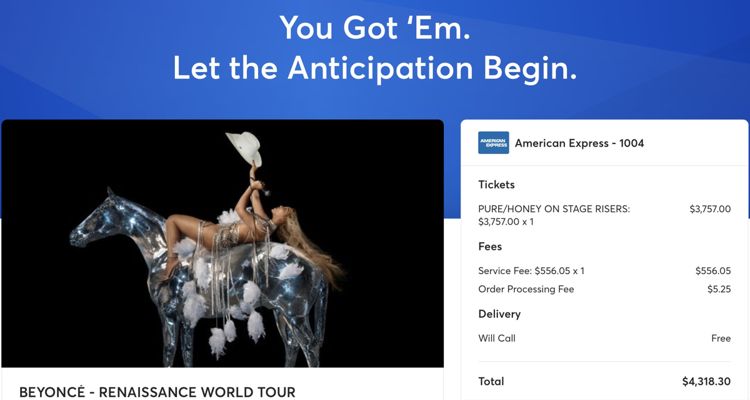Photo Credit: Kalen Allen Twitter
Ticketmaster’s ‘new approach’ to ticket sales hasn’t resulted in lower prices. Ticket prices for the Beyonce Renaissance tour have reached $,4000+.
Ticketmaster announced the new approach of dividing cities into three groups with staggered registration deadlines and presale dates. The goal was to minimize the impact of bots—but the results have been disastrous for actual fans.
VIP packages started at $3,700 for a single ticket, with a $550 service charge from Ticketmaster tacked on. But even the most ‘affordable’ seats are seeing sky-high service fees on their less than reasonable ticket prices. A ticket price of $162 generated a service fee of $43.90. These tacked on fees are one item of discussion among regulators for creating more transparent ticket sales for fans.
Ticketmaster has already admitted that demand for Beyonce has outpaced even Taylor Swift. 2.4 million fans bought ‘Eras’ tickets within their first few hours of availability, exceeding demand by 243%. Meanwhile, the demand for Renaissance tickets has exceeded 800% by Ticketmaster’s own estimates.
Ticketmaster’s dynamic pricing approach is at the heart of the issue. The more demand there is for the tickets, the higher the price will rise.
That means even higher ticket prices on the secondary market. Why didn’t Beyonce use another service? Ticketmaster is owned by Live Nation, who owns the stadium venues in which Beyonce wants to draw her massive crowds. It’s a catch-22 that Live Nation promised wouldn’t happen when it merged with Ticketmaster in 2010.
“Because the number of Verified Fans will exceed the number of available tickets, there will be disappointed people,” adds David Herlihy, a Professor at Northeastern and coordinator of its Music Industry program. Herlihy spoke to Forbes about how he thinks the Ticketmaster sale of Beyonce tickets will go. “Ticketmaster could help itself by being more transparent. That means telling fans how many tickets are available at each venue before they go on sale. Ideally, there would be a perfect match between supply and demand with no price gouging—but that is a fairy tale.”

